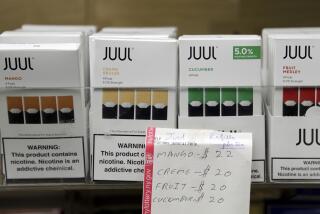Tobacco Case Funds Withheld
- Share via
Tobacco companies put more than $700 million aside Monday rather than hand it over to the states in their battle over how much cigarette makers owe this year under a landmark 1998 settlement.
R.J. Reynolds Tobacco Co. paid the states about $1.4 billion but withheld $647 million, putting it in a “disputed payments account,” Reynolds general counsel Charles Blixt said.
Blixt said the company was playing by the rules of the agreement: “This is the mechanism by which we withhold money.”
Reynolds believes it does not have to pay the extra $647 million, Blixt said, because of a provision in the deal that allows the cigarette makers to pay less if they have lost market share to smaller companies that weren’t part of the settlement.
An economic consulting firm concluded last month that the agreement, which set marketing limits on the companies and required payments to states, was a “significant factor” contributing to the loss of market share.
The states’ attorneys general say the companies would be entitled to a reduction only if states fail to adequately enforce laws requiring cigarette makers outside the settlement to put money in escrow for future legal obligations.
“The states all take the position that when the dispute is finally settled we will be entitled to all the moneys placed into the disputed payments account today, with interest, and we will take all necessary steps to ensure that these disputes are resolved as speedily as possible,” Connecticut Atty. Gen. Richard Blumenthal said in a written statement.
Blixt said cigarette makers were working together to try to resolve their disagreement with the states.
Lorillard Tobacco Corp. is withholding $108 million and putting that in a disputed escrow account, Blixt said. He said Lorillard was paying the states $558 million. The payments were due Monday.
Industry leader Philip Morris USA said earlier this month it had made all of its $3.4 billion payment, but that it too believes the sum eventually should be reduced.
Philip Morris spokesman Michael Neese said the company hoped it could negotiate an agreement with the states. “We’re going to continue to strive for that resolution.”
If the negotiations don’t lead to a resolution, Blixt said the issue should go to arbitration before a three-judge panel.
More to Read
Sign up for Essential California
The most important California stories and recommendations in your inbox every morning.
You may occasionally receive promotional content from the Los Angeles Times.










